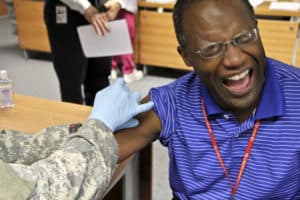Getting a flu shot is often thought of as a necessary evil. But what if the mood you’re in while you’re getting a shot determines how effective it will be?
Researchers from the University of Nottingham in the UK conducted a study, the first of its kind, to understand how behavioral and psychological influences changed the effectiveness of the flu shot within the elderly. Kavita Vedhara, a professor with the University’s Division of Primary Care, said immunizations are effective, but have a certain weakness.

“Vaccinations are an incredibly effective way of reducing the likelihood of catching infectious diseases. But their Achilles heel is that their ability to protect against disease is affected by how well an individual’s immune system works,” Vedhara told Science Daily. “So people with less effective immune systems, such as the elderly, may find vaccines don’t work as well for them as they do in the young.”
Clinical efficacy is believed to be 17 to 53 percent in older adults versus 70 to 90 percent in younger adults, meaning the flu vaccine is least effective for those who need it the most, the study authors said. The study controlled recruitment for adults between the ages of 65 and 85 who had been vaccinated the previous year, and accepted 138 participants.
Over a period of six weeks, the researchers assessed the participants’ negative and positive moods, stress, physical activity, nutrition and sleep patterns before being vaccinated. After the vaccination, they then analyzed the success of the shot by measuring the amount of antibodies in the participants’ blood four and 16 weeks later.
“We have known for many years that a number of psychological and behavioral factors such as stress, physical activity and diet influence how well the immune system works and these factors have also been shown to influence how well vaccines protect against disease,” Vedhara said.
Related: Flu Vaccine Patch Kicks Painful Needles to the Curb
The study found that maintaining a greater positive mood during the six week period around a vaccination, or on the day of the vaccination, significantly indicated a greater antibody response to the vaccine. This effect was only relevant to the weakest viral strain H1N1, and was not found for the other strains used in the study, known as H3N2 and B strains.
A positive mood on the day of vaccination appeared to have the best significant effects compared to the positive mood during the six week period around the vaccination. The vaccination day could be a particularly important time where the positive mood influences a body’s immune response, the authors wrote.
While the positive mood on the day of vaccination was significant, it didn’t appear to be completely independent of developing a positive mood during the six weeks around the vaccination. The association was unclear, causing the researchers to question what exactly a patient should do for the best vaccination results.
“This raises an interesting question regarding whether it might be sufficient to change mood on the day of vaccine to achieve an improved antibody response to vaccination or if it is necessary to change mood over longer periods,” the authors wrote.
Tori Linville is a freelance writer and editor from Clarksville, Tennessee. When she isn’t writing or teaching, she’s faithfully watching her alma mater, the University of Alabama, dominate the football field.


![How To: ‘Fix’ Crepey Skin [Watch]](https://cdn.vitalupdates.com/wp-content/uploads/2017/05/bhmdad.png)












